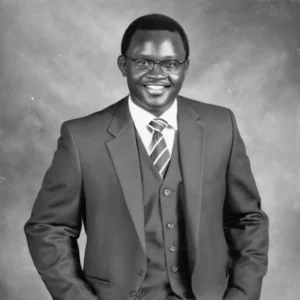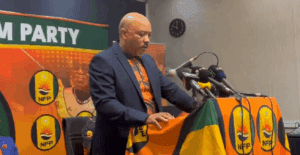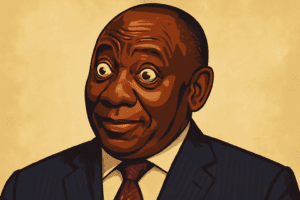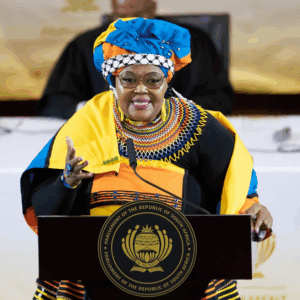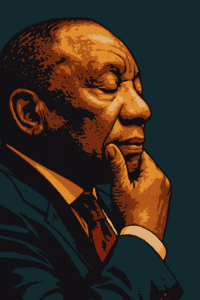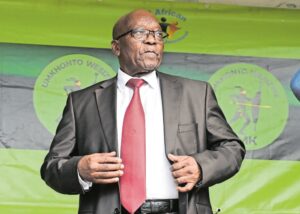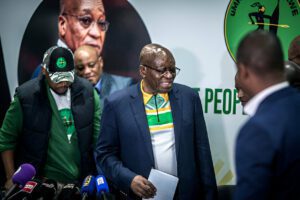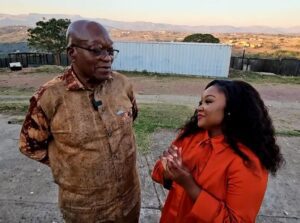The Economic Freedom Fighters (EFF) experienced a significant setback on August 15 when prominent figures within the party, including deputy president Floyd Shivambu and Mzwanele Manyi, opted to leave the organization. Both leaders have traded in their iconic red berets for the symbolic spears of the uMkhonto weSizwe (MK) party, an eight-month-old political movement aligned with former President Jacob Zuma.
Mzwanele Manyi’s move has sparked notable conversation, particularly given his recent history of political party affiliations. Manyi has shifted political allegiances multiple times over the past five years, a fact that has drawn criticism from various quarters. His frequent changes in political alignment have been likened to a revolving door, leading some to question his commitment to any particular ideology.
Dear arrivalists in politics.
A sell-out is someone that sides with the ideological enemy of the struggle.
E.g ANC/DA coalition.
Joining H.E President Zuma, a Freedom Fighter with unquestionable political credentials is a revolutionary act.
Let that sink. pic.twitter.com/Q1z9c96ArF— Mzwanele Manyi (@MzwaneleManyi) August 18, 2024
Renowned political analyst Professor Sipho Seepe weighed in on Manyi’s latest move, describing it as a return to the core values he once admired in the African National Congress (ANC) during Zuma’s presidency. According to Seepe, Manyi’s decision to align with the MK party feels like “going home” as it embodies the same principles that once characterized the ANC under Zuma’s leadership.
“When Zuma was still the president, Manyi was still at the ANC, and when Msholozi left, for Manyi it was that the ANC also changed and became a party by a prepaid president (Ramaphosa),”
Seepe explained.
Manyi’s disillusionment with the ANC reportedly began after Cyril Ramaphosa assumed leadership of the party. Seepe indicated that Manyi felt the ANC had lost touch with its original principles under Ramaphosa’s direction.
“Manyi’s decision for leaving was that the ANC of Ramaphosa, for him, had abandoned what the party stood for, in the same way that people like Dali Mpofu had left the party. It was not because they were expelled, but it had become another animal that is different from the ANC that they formed part of in the last 33 years,”
Seepe added.
The formation of the MK party by Zuma offered Manyi a fresh political home, one that Seepe believes resonates with Manyi’s earlier beliefs about the ANC. The MK party presents itself as a return to the roots of the ANC, a vision that Manyi found lacking in Ramaphosa’s ANC and the EFF.
“He felt that now, he was parking at the EFF, but found that MK party satisfied everything he used to like in the ANC, which had been abandoned by Ramaphosa,”
Seepe noted.
Seepe also highlighted that Manyi’s shift to the MK party and departure from the EFF could be seen as a reflection of his political maturation.
“It might also be possible that he left the EFF because he has outgrown the politics of that party. Same with Floyd Shivambu, he has also outgrown the politics of the party,”
Seepe suggested.
When asked about the possibility of Manyi jumping to yet another political party, Seepe remained skeptical.
“I don’t think there is any other party that he can go to because the space is already crowded. I think the MK party has taken a space of people who were disgruntled with the ANC, and they did not want to join the EFF,”
he remarked.
For his part, Manyi remains unapologetic about his political decisions. In an interview on Power Breakfast, he made it clear that his political moves are always driven by an underlying agenda.
“I make no apologies for leaving. What is important for me is the agenda. If you check my moves, they will always be on progressive agenda—on the left agenda. The more left you are, the more I get attracted to you,”
he emphasized.
However, not everyone has been supportive of Manyi’s choices. Last week, EFF MP Carl Niehaus publicly criticized Manyi on social media, expressing disappointment over his departure from the party. Niehaus pointed out that during Manyi’s challenging times, EFF leader Julius Malema extended support and welcomed him into the party.
In response, Manyi dismissed the notion that he had endured difficulties upon joining the EFF, effectively rejecting Niehaus’s claims.
